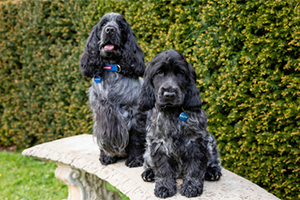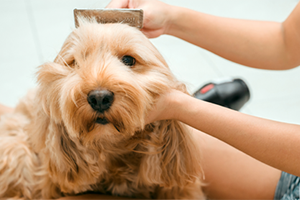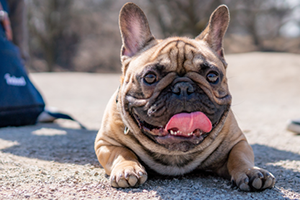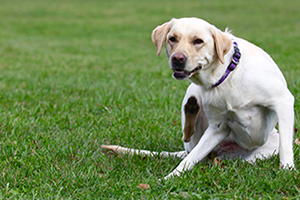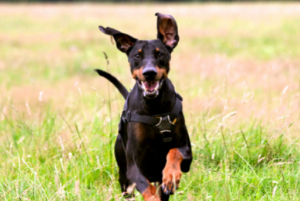
A devoted companion with a playful personality
Vital stats
Swipe to view more
| Size: | Large |
| Coat: | Short and thick |
| Exercise | 2+ hours a day |
| Life span: | 8-10 years |
| Breed group: | Working |
| Temperament: | Devoted, good-natured, courageous |
Rottweiler temperament & personality

- They can make playful and gentle family pets and are loyal to anyone they perceive as part of their ‘pack’.
- They thrive on stimulation and exercise, grasp new commands quickly and are excellent service and police dogs.
- Experts recommend them as good pets for more experienced owners as previous knowledge of training and handling can be helpful to ensure they grow into well-rounded pets and help to prevent dog behaviour problems.
Rottweiler training & exercise

Training tips
- Rottweiler puppies can be taught simple commands from eight weeks old.
- Safely exposing your Rottweiler to lots of new experiences and people at a young age will ensure they grow into happy, confident and sociable dogs. Puppy training classes can be a good place to start when it comes to socialising your dog.
- As this breed’s natural instinct is to protect their families, it’s vital to channel their defensive capabilities from early on with good socialisation and positive reinforcement
Game ideas
Exercise
- It’s important to start introducing exercise slowly from around the time a Rottweiler puppy is four months old, so that their growing bones and joints strengthen gradually and aren’t overexerted.
- To help your Rottweiler keep both physically and mentally fit, experts recommend at least two hours of exercise and interactive games daily, with plenty of secure space to run free.
Keeping them happy
- Rottweilers are highly energetic and can stay just as playful as puppies well into adulthood so make sure you have plenty of time to play with your pup!
- Rottweilers are loyal dogs that often form close attachments to the humans they perceive as part of their ‘pack’. This means they can be prone to separation anxiety and tend to be happiest in households where someone is around for most of the day.
Common Rottweiler health conditions

Rottweiler grooming

Rottweiler grooming is relatively low maintenance and a great opportunity for you to bond with your dog.
- Their black and tan coats are short, thick and prone to shedding. You may also come across longer-haired Rottweilers, although this variation is slightly less common.
- Brushing is needed at least once a week to remove any loose hair and keep their coat shiny and healthy
- Check their ears often for tell-tale signs of infection, such as a strange smell or black or brown wax.
- Whilst grooming, check their bodies for any lumps or signs of parasites
- Regular tooth brushing helps reduce the build-up of tartar, keeping their gums healthy and ensuring that bad breath stays away
Rottweiler nutrition

Rottweilers can be prone to bloat (where, in extreme cases, the stomach can become twisted), so it’s important to feed two smaller portions a day, instead of one larger helping.
- Vets recommend that the best food for a Rottweiler is a high-quality pet food and to use your pet's food packaging for guidelines, keeping in mind their age, size and activity levels.
- Rottweiler puppies can occasionally have tummy trouble, but initially sticking to the same feeding schedule and routine as your breeder will help to prevent any upsets.
- If you change your dog’s diet, at any stage of life, make sure to do so gradually. Slowly increase the amount of new food you add over the course of a few weeks, decreasing their previous food accordingly
- If you notice any digestive issues, speak to your vet straight away
Rottweiler frequently asked questions
Discover some of the most popular dog breeds
Rottweiler insurance considerations
We always offer these things as standard:
Physiotherapy & pet therapies
Along with physiotherapy, which is covered within the Vet Bills benefit, we also cover Pet Therapies like herbal medicine, homeopathy and acupuncture. You can also claim for hydrotherapy, up to £500 per illness/injury in dogs and cats (no additional limit for rabbits).
Petplan is a trading name of Pet Plan Limited (Registered in England No. 1282939) and Allianz Insurance plc (Registered in England No. 84638), Registered office: 57 Ladymead, Guildford, Surrey GU1 1DB.
Pet Plan Limited is authorised and regulated by the Financial Conduct Authority. Financial Services Register No. 311969. Allianz Insurance plc is authorised by the Prudential Regulation Authority and regulated by the Financial Conduct Authority and the Prudential Regulation Authority. Financial Services Register No. 121849. Pet Plan Limited is a subsidiary of Allianz Insurance plc.






































